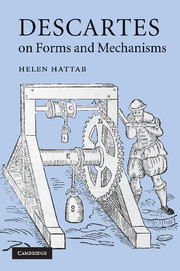Book contents
- Frontmatter
- Contents
- Acknowledgments
- List of abbreviations
- Introduction
- PART I RESURRECTING THE SUBSTANTIAL FORM
- PART II CHALLENGING THE SUBSTANTIAL FORM
- 4 Sanchez's skeptical humanist attack
- 5 The mechanical alternative to substantial forms
- 6 Cartesian science and the principles of Aristotelian mechanics
- PART III ELIMINATING SUBSTANTIAL FORMS
- Works cited
- Index
5 - The mechanical alternative to substantial forms
Published online by Cambridge University Press: 15 September 2009
- Frontmatter
- Contents
- Acknowledgments
- List of abbreviations
- Introduction
- PART I RESURRECTING THE SUBSTANTIAL FORM
- PART II CHALLENGING THE SUBSTANTIAL FORM
- 4 Sanchez's skeptical humanist attack
- 5 The mechanical alternative to substantial forms
- 6 Cartesian science and the principles of Aristotelian mechanics
- PART III ELIMINATING SUBSTANTIAL FORMS
- Works cited
- Index
Summary
The arguments discussed in the previous chapter illustrate the intense dissatisfaction among practical men of science, like Sanchez, with the foundations of Aristotelian scientific explanations, as well as the impotence of Suarez's empirical defense of the substantial form in the face of global skepticism. However, since Sanchez provides no positive solution, only negative skeptical arguments, it is not surprising that, in the absence of better alternatives, Aristotelian scientific explanations prevailed. Still, the parallel Sanchez draws between the difficulty of discovering the clock's underlying mechanisms from the motions of the decorative clock-face, and the difficulty of uncovering the causes behind sensible natural phenomena, suggests a way out. If the universe were just like the clock, we could come to explain natural phenomena by positing their underlying mechanisms. Indeed, Descartes highlights the irrelevance of substantial forms when explaining the actions of mechanical devices in the second argument against substantial forms he proposes to Regius: “All the reasons for proving substantial forms could be applied to the form of a watch, which nevertheless, no one calls substantial.” In the second thesis he justifies the replacement of substantial forms by the kinds of principles appealed to in the case of a watch by denying the distinction between natural and mechanical phenomena. Automata, he insists, are also works of nature. When building them we simply apply active things to passive things as we do when we sow grain or breed a mule.
Information
- Type
- Chapter
- Information
- Descartes on Forms and Mechanisms , pp. 85 - 119Publisher: Cambridge University PressPrint publication year: 2009
